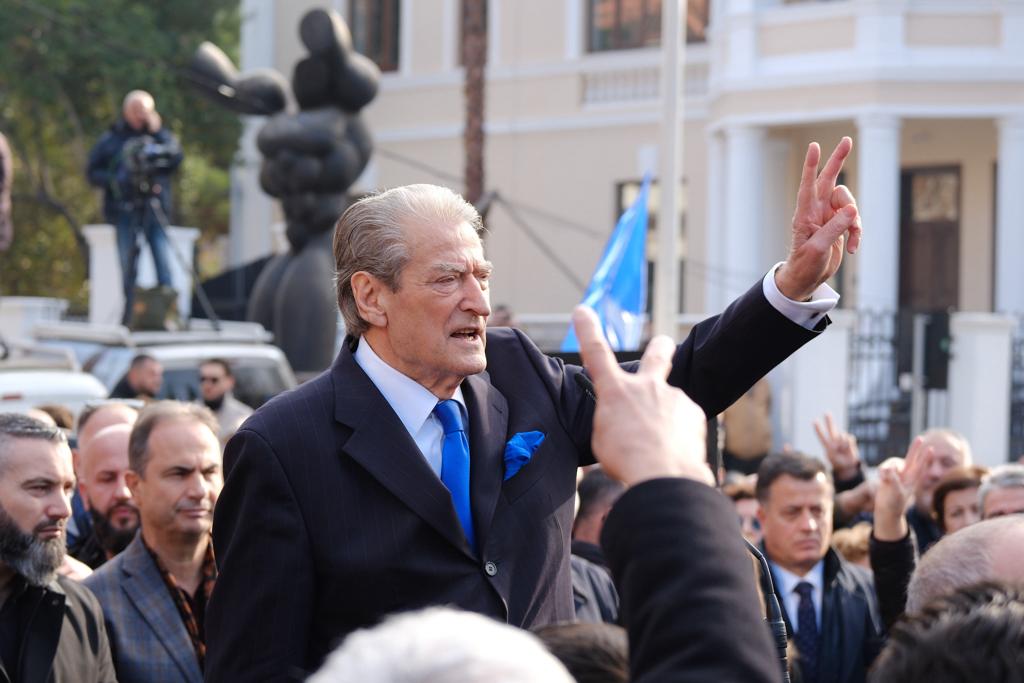Democratic Party postpones protest to October 7th, calls for civil disobedience

Photo: Sali Berisha
The Democratic Party (DP) has postponed its planned protest to 7 October, with the event set to begin at 18:00 in front of the Prime Minister’s Office in Tirana. The protest aims to paralyze the government and force Prime Minister Edi Rama to accept a technical government to oversee the upcoming parliamentary elections.
Why is this important: The decision marks the latest instance of the DP attempting to escalate its actions ahead of elections, a strategy often used in the past. While the DP hopes the protest will pressure the government, previous efforts, including roadblocks, mass gatherings, and civil disobedience, have largely failed to yield any political victories. This protest comes in response to the conviction of MP Ervin Salianji, which the DP views as part of a broader campaign against the opposition.
Protest Strategy: The plan foresees a mass gathering in front of the Prime Minister’s Office. Unlike previous protests, no speeches are planned. Instead, the crowd will then disperse to block key entrances to the capital and main roads across the country. The aim is to use civil disobedience tactics to disrupt normal activities and force the government to concede to the opposition’s demands.
Sali Berisha’s call to action: At the DP’s National Council meeting, party leader Sali Berisha emphasized the need for mass mobilization, claiming that his supporters are ready to act. “Rama has the tools to arrest us, but we have the means to paralyze the entire country,” Berisha declared, adding that it would take just a fraction of the opposition’s supporters with the will to act decisively to achieve the objectives. His ultimate goal is to paralyze the government until a technical government is formed to manage the next elections.
Context and precedents: It is not the first time the DP has resorted to such tactics in its 11 years of opposition. In 2017, under Lulzim Basha’s leadership, the party occupied Tirana’s main boulevard for nearly a month, demanding a caretaker government. The protest ended with a controversial agreement between Basha and Rama, which granted the DP several key ministerial positions, including the Interior and Finance Ministries. However, despite these concessions, Basha suffered a major defeat in the elections that followed.
Since then, the DP has held numerous protests, many of them violent, and even went so far as to burn its parliamentary mandates and boycott the 2019 local elections. None of these actions have brought the party closer to electoral victory. Instead, they plunged the DP into internal crises. It was Berisha that largely dictated party decisions for most of this time despite officially being just an MP. However, after being designated “non grata” by the U.S., Berisha publicly blamed Basha for every electoral defeat. This led to a split in the party, with Basha’s group eventually expelling Berisha from the parliamentary group and siding with the U.S.
The internal divide deepened, leading to legal battles over the party’s headquarters, logo, and leadership. The peak of this conflict came on January 8, 2022, when Berisha’s supporters attempted to storm the DP headquarters, clashing with Basha’s loyalists in a violent confrontation. This internal strife has only strengthened Rama’s position, as the Socialist Party has consistently defeated the DP in every election since 2013.
Conclusion: The DP’s reliance on protests, violence, and boycotts has historically failed to bring the party closer to power. As the new wave of civil disobedience begins on 7 October, it remains uncertain whether this strategy will change the DP’s fortunes, which have been marked by repeated electoral losses.


